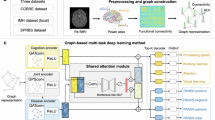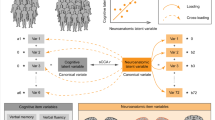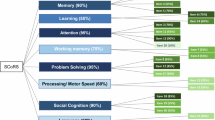Abstract
Neurocognition is moderately to severely impaired in patients with schizophrenia. However, the factor structure of the various neurocognitive deficits, the relationship with symptoms and other variables, and the minimum amount of testing required to determine an adequate composite score has not been determined in typical patients with schizophrenia. An ‘all-comer’ approach to cognition is needed, as provided by the baseline assessment of an unprecedented number of patients in the CATIE (Clinical Antipsychotic Trials of Intervention Effectiveness) schizophrenia trial. From academic sites and treatment providers representative of the community, 1493 patients with chronic schizophrenia were entered into the study, including those with medical comorbidity and substance abuse. Eleven neurocognitive tests were administered, resulting in 24 individual scores reduced to nine neurocognitive outcome measures, five domain scores and a composite score. Despite minimal screening procedures, 91.2% of patients provided meaningful neurocognitive data. Exploratory principal components analysis yielded one factor accounting for 45% of the test variance. Confirmatory factor analysis showed that a single-factor model comprised of five domain scores was the best fit. The correlations among the factors were medium to high, and scores on individual factors were very highly correlated with the single composite score. Neurocognitive deficits were modestly correlated with negative symptom severity (r=0.13–0.27), but correlations with positive symptom severity were near zero (r<0.08). Even in an ‘all-comer’ clinical trial, neurocognitive deficits can be assessed in the overwhelming majority of patients, and the severity of impairment is similar to meta-analytic estimates. Multiple analyses suggested that a broad cognitive deficit characterizes this sample. These deficits are modestly related to negative symptoms and essentially independent of positive symptom severity.
Similar content being viewed by others
Log in or create a free account to read this content
Gain free access to this article, as well as selected content from this journal and more on nature.com
or
References
Addington J, Addington D, Maticka-Tyndale E (1991). Cognitive functioning and positive and negative symptoms in schizophrenia. Schizophr Res 5: 123–134.
Arbuckle JL (2003). Amos 5.0 Update to the Amos User's Guide. SPSS: Chicago, IL.
Barua P, Bilder R, Small A, Sharma T (2005). Standardization and cross-validation study of cogtest an automated neurocognitive batter for use in clinical trials of schizophrenia. Schizophr Bull 31: 318.
Benton AL, Hamscher K (1978). Multilingual Aphasia Examination Manual (revised). University of Iowa: Iowa City, IA.
Bilder RM, Goldman RS, Robinson D, Reiter G, Bell L, Bates JA et al (2000). Neuropsychology of first-episode schizophrenia: initial characterization and clinical correlates. Am J Psychiatry 157: 549–559.
Bowie CR, Serper MR, Riggio S, Harvey PD (2005). Neurocognition, symptomatology and functional skills in older alcohol-abusing schizophrenia patients. Schizophr Bull 31: 175–182.
Brandt J, Benedict R (1991). Hopkins Verbal Learning Test. Psychological Assessment Resources: Lutz, FL.
Browne M, Cudeck R (1993). Alternative ways of assessing model fit. In: Bollen K, Long J (eds). Testing Structural Equation Models. Sage Publications: Newbury Park, CA. pp 136–162.
Buchanan RW, Strauss ME, Breier A, Kirkpatrick B, Carpenter WT (1997). Attentional impairments in deficit and nondeficit forms of schizophrenia. Am J Psychiatry 154: 363–370.
Chapman LJ, Chapman JP (1973). Disordered Thought in Schizophrenia. Appleton-Century-Crofts: New York.
Cohen J (1977). Statistical Power Analysis for the Behavioral Sciences (Revised). Academic Press: Orlando, FL.
Cornblatt BA, Keilp JG (1994). Impaired attention, genetics, and the pathophysiology of schizophrenia. Schizophr Bull 20: 31–46.
Dickinson D, Iannone VN, Wilk CM, Gold JM (2004). General and specific cognitive deficits in schizophrenia. Biol Psychiatry 55: 826–833.
Dickinson D, Ragland JD, Calkins ME, Gold JM, Gur RC (in press). A comparison of cognitive structure in schizophrenia patients and healthy controls using confirmatory factor analysis. Schizophr Res.
First MB, Spitzer RL, Gibbon M, Williams JBW (1996). Structured Clinical Interview for Axes I and II DSM-IV Disorders-Patient Edition (SCID-I/P). Biometrics Research Department, New York State Psychiatric Institute: New York.
Gladsjo JA, McAdams LA, Palmer BW, Moore DJ, Jeste DV, Heaton RK (2004). A six-factor model of cognition in schizophrenia and related psychotic disorders: Relationships with clinical symptoms and functional capacity. Schizophr Bull 30: 739–754.
Gold JM, Carpenter C, Randolph C, Goldberg TE, Weinberger DR (1997). Auditory working memory and Wisconsin Card Sorting Test performance in schizophrenia. Arch Gen Psychiatry 54: 159–165.
Goldberg TE, Gold JM, Greenberg R, Griffin S, Schulz SC, Pickar D et al (1993). Contrasts between patients with affective disorders and patients with schizophrenia on a neuropsychological test battery. Am J Psychiatry 150: 1355–1362.
Green AI, Tohen MF, Hamer RM, Strakowski SM, Lieberman JA, Glick I et al (2004a). First episode schizophrenia-related psychosis and substance use disorders: acute response to olanzapine and haloperidol. Schizophr Res 66: 125–135.
Green MF, Kern RS, Braff DL, Mintz J (2000). Neurocognitive deficits and functional outcome in schizophrenia: are we measuring the ‘right stuff’? Schizophr Bull 26: 119–136.
Green MF, Nuechterlein KH, Gold JM, Barch D, Cohen J, Essock S et al (2004b). Approaching a consensus cognitive battery for clinical trials in schizophrenia: the NIMH-MATRICS conference to select cognitive domains and test criteria. Biol Psychiatry 56: 301–307.
Green MF (1996). What are the functional consequences of neurocognitive deficits in schizophrenia? Am J Psychiatry 153: 321–330.
Guy W (1976). Early Clinical Drug Evaluation (ECDEU), Assessment Manual. National Institute of Mental Health: Rockville, MD.
Harvey PD, Green MF, McGurk SR, Meltzer HY (2003). Changes in cognitive functioning with risperidone and olanzapine treatment: A large-scale, double blind, randomized study. Psychopharmacology 169: 404–411.
Harvey PD, Keefe RSE (1997). Cognitive impairment in schizophrenia and implications of atypical neuroleptic treatment. CNS Spectr 2: 1–11.
Harvey PD, Keefe RSE (2001). Studies of cognitive change in patients with schizophrenia following novel antipsychotic treatment. Am J Psych 158: 176–184.
Harvey PD, Lombardi J, Leibman M, White L, Parrella M, Powchik P et al (1996). Cognitive impairment and negative symptoms in schizophrenia: a prospective study of their relationship. Schizophr Res 22: 223–231.
Harvey PD, Siu CO, Romano S (2004). Randomized, controlled, double-blind, multicenter comparison of the cognitive effects of ziprasidone versus olanzapine in acutely ill inpatients with schizophrenia and schizoaffective disorder. Psychopharmacology 172: 324–332.
Heaton RK, Gladsjo JA, Palmer BW, Kuck J, Marcotte TD, Jeste DV (2001). Stability and course of neuropsychological deficits in schizophrenia. Arch Gen Psychiatry 58: 24–32.
Heinrichs RW, Zakzanis KK (1998). Neurocognitive deficit in schizophrenia: a quantitative review of the evidence. Neuropsychology 12: 426–444.
Hughes C, Kumari V, Soni W, Das M, Binneman B, Drozd S et al (2003). Longitudinal study of symptoms and cognitive function in chronic schizophrenia. Schizophr Res 59: 137–146.
Hyman SE, Fenton WS (2003). What are the right targets for psychopharmacology? Science 299: 350–351.
Kay SR, Fiszbein A, Opler LA (1987). The positive and negative syndrome scale (PANSS) for schizophrenia. Schizophr Bull 13: 261–276.
Keefe RSE, Eesley CE, Poe MP (2005). Defining a cognitive function decrement in schizophrenia. Biol Psychiatry 57: 688–691.
Keefe RSE, Goldberg TE, Harvey PD, Gold JM, Poe M, Coughenour L (2004). The brief assessment of cognition in schizophrenia: reliability, sensitivity, and comparison with a standard neurocognitive battery. Schizophr Res 68: 283–297.
Keefe RSE, Mohs RC, Bilder RM, Harvey PD, Green MF, Meltzer HY et al (2003). Neurocognitive Assessment in the Clinical Antipsychotic Trials of Intervention Effectiveness (CATIE) project schizophrenia trial: development, methodology and rationale. Schizophr Bull 29: 45–55.
Kenny DA, Kashy DA, Bolger N (1988). Data analysis in social psychology. In: Gilbert D, Fiske S, Lindzey G (eds). Handbook of Social Psychology, 4th edn. McGraw-Hill: Boston. pp 233–265.
Kerr SL, Neale JM (1993). Emotion perception in schizophrenia: specific deficit or further evidence of generalized poor performance? J Abnorm Psychol 102: 312–318.
Kongs SK, Thompson LL, Iverson GL, Heaton RK (2000). Wisconsin Card Sorting Test-64 Card Version Professional Manual. Psychological Assessment Resources, Inc.: Lutz, FL.
Lafayette Instrument Company (1989). Grooved Pegboard Instruction Manual, Model 32025. Lafayette Instrument Company: Lafayette, Indiana.
Lyons-Warren A, Lillie R, Hershey T (2004). Short and long-term spatial delayed response performance across the lifespan. Dev Neuropsych 26: 661–678.
Mohamed S, Paulsen JS, O'Leary D, Arndt S, Andreasen N (1999). Generalized cognitive deficits in schizophrenia: a study of first-episode patients. Arch Gen Psychiatry 56: 749–754.
Nuechterlein KH, Barch DM, Gold JM, Goldberg TE, Green MF, Heaton RK (2004). Identification of separable cognitive factors in schizophrenia. Schizophr Res 72: 29–39.
Saykin AJ, Gur RC, Gur RE, Mozley PD, Mozley LH, Resnick SM et al (1991). Neuropsychological function in schizophrenia. Selective impairment in memory and learning. Arch Gen Psychiatry 48: 618–624.
Slade E, Salkever D, Rosenheck R, Swanson J, Swartz M, Shern D et al (2005). Cost-sharing requirements and access to mental health care among medicare enrollees with schizophrenia. Psychiatr Serv 56: 960–966.
Stirling J, Lewis S, Hopkins R, White C (2005). Cannabis use prior to first onset psychosis predicts spared neurocognition at 10-year follow-up. Schizophr Res 75: 135–138.
Strauss ME (1993). Relations of symptoms to cognitive deficits in schizophrenia. Schizophr Bull 19: 215–231.
Stroup TS, McEvoy JP, Swartz MS, Byerly MJ, Glick ID, Canive JM et al (2003). The National Institute of Mental Health Clinical Antipsychotic Trials of Intervention Effectiveness (CATIE) Project: schizophrenia trial design and protocol development. Schizophr Bull 29: 15–31.
Swanson JW, Swartz MS, Van Dorn RA, Elbogen EB, Wagner HR, Rosenheck RA et al (in press). A national study of violent behavior in persons with schizophrenia. Arch Gen Psychiatry.
Tamlyn D, McKenna PJ, Mortimer AM, Lund CE, Hammond S, Baddeley AD (1992). Memory impairment in schizophrenia: its extent, affiliations and neuropsychological character. Psychol Med 22: 101–115.
Tulsky DS, Price LR (2003). The joint WAIS-III and WMS-III factor structure: development and cross-validation of a six-factor model of cognitive functioning. Psychol Assess 15: 149–162.
Velligan DI, DiCocco M, Bow-Thomas CC, Cadle C, Glahn DC, Miller AL et al (2004). A brief cognitive assessment for use with schizophrenia patients in community clinics. Schizophr Res 71: 273–283.
Wechsler D (1974). Wechsler Adult Intelligence Scale, Revised edn. Psychological Corporation: San Antonio, TX.
Wechsler D (1991). Wechsler Intelligence Scale for Children, 3rd edn. Harcourt Publishers, NY.
Wechsler D (1997a). Wechsler Adult Intelligence Scale, 3rd edn. Psychological Corporation: San Antonio, TX.
Wechsler D (1997b). Wechsler Memory Scale, 3rd edn. Psychological Corporation: San Antonio, TX.
Wilk CM, Gold JM, Humber K, Dickerson F, Fenton WS, Buchanan RW (2004). Brief cognitive assessment in schizophrenia: Normative data for the Repeatable Battery for the Assessment of Neuropsychological Status. Schizophr Res 70: 175–186.
Wilk CM, Gold JM, McMahon RP, Humber K, Lannone VN, Buchanan RW (2005). No, it is not possible to be schizophrenic yet neuropsychologically normal. Neuropsychology 19: 778–786.
Woodward ND, Purdon SE, Meltzer HY, Zald DH (2005). A meta-analysis of neuropsychological change to clozapine, olanzapine, quetiapine, and risperidone in schizophrenia. Int J Neuropsychopharm 8: 1–16.
Acknowledgements
We are indebted to the 1493 participants in the Clinical Antipsychotic Trials of Intervention Effectiveness (CATIE) Schizophrenia Trial for their collaboration.
We gratefully acknowledge the statistical contributions of Sarah Kavanagh from Quintiles and Abraham Reichenberg, PhD and Christopher Bowie, PhD from Mount Sinai School of Medicine; comments on the manuscript from Keith Nuechterlein from UCLA; administrative assistance of Ingrid Rojas-Eloi, BS, Project Manager of the CATIE; and technical assistance of Kirsten Hawkins, research assistant, Department of Psychiatry and Behavioral Sciences, Duke University Medical Center.
Author information
Authors and Affiliations
Corresponding author
Additional information
The CATIE Investigators are listed in Appendix I.
Presented in part at the annual meetings of the International Congress for Schizophrenia Research in Savannah, Georgia, April 2005, and the Society for Biological Psychiatry in Atlanta, Georgia in May, 2005.
Appendices
Appendix I
CATIE Study Investigators Group includes: Lawrence Adler, MD, Clinical Insights, Glen Burnie, MD; Mohammed Bari, MD, Synergy Clinical Research, Chula Vista, CA; Irving Belz, MD, Tri-County/MHMR, Conroe, TX; Raymond Bland, MD, Southern Illinois University School of Medicine, Springfield, IL; Thomas Blocher, MD, MHMRA of Harris County, Houston, TX; Brent Bolyard, MD, Cox North Hospital, Springfield, MO; Alan Buffenstein, MD, The Queen's Medical Center, Honolulu, HI; John Burruss, MD, Baylor College of Medicine, Houston, TX; Matthew Byerly, MD, University of Texas Southwestern Medical Center at Dallas, Dallas, TX; Jose Canive, MD, Albuquerque VA Medical Center, Albuquerque, NM; Stanley Caroff, MD, Behavioral Health Service, Philadelphia, PA; Charles Casat, MD, Behavioral Health Center, Charlotte, NC; Eugenio Chavez-Rice, MD, El Paso Community MHMR Center, El Paso, TX; John Csernansky, MD, Washington University School of Medicine, St Louis, MO; Pedro Delgado, MD, University Hospitals of Cleveland, Cleveland, OH; Richard Douyon, MD, VA Medical Center, Miami, FL; Cyril D'Souza, MD, Connecticut Mental Health Center, New Haven, CT; Ira Glick, MD, Stanford University School of Medicine, Stanford, CA; Donald Goff, MD, Massachusetts General Hospital, Boston, MA; Silvia Gratz, MD, Eastern Pennsylvania Psychiatric Institute, Philadelphia, PA; George T Grossberg, MD, St Louis University School of Medicine-Wohl Institute, St Louis, MO; Mahlon Hale, MD, New Britain General Hospital, New Britain, CT; Mark Hamner, MD, Medical University of South Carolina and Veterans Affairs Medical Center, Charleston, SC; Richard Jaffe, MD, Belmont Center for Comprehensive Treatment, Philadelphia, PA; Dilip Jeste, MD, University of California-San Diego, VA Medical Center, San Diego, CA; Anita Kablinger, MD, Louisiana State University Health Sciences Center, Shreveport, LA; Ahsan Khan, MD, Psychiatric Research Institute, Wichita, KS; Steven Lamberti, MD, University of Rochester Medical Center, Rochester, NY; Michael T Levy, MD, PC, Staten Island University Hospital, Staten Island, NY; Jeffrey Lieberman, MD, University of North Carolina School of Medicine, Chapel Hill, NC; Gerald Maguire, MD, University of California Irvine, Orange, CA; Theo Manschreck, MD, Corrigan Mental Health Center, Fall River, MA; Joseph McEvoy, MD, Duke University Medical Center, Durham, NC; Mark McGee, MD, Appalachian Psychiatric Healthcare System, Athens, OH; Herbert Meltzer, MD, Vanderbilt University Medical Center, Nashville, TN; Alexander Miller, MD, University of Texas Health Science Center at San Antonio, San Antonio, TX; Del D Miller, MD, University of Iowa, Iowa City, IA; Henry Nasrallah, MD, University of Cincinnati Medical Center, Cincinnati, OH; Charles Nemeroff, MD, PhD, Emory University School of Medicine, Atlanta, GA; Stephen Olson, MD, University of Minnesota Medical School, Minneapolis, MN; Gregory F Oxenkrug, MD, St Elizabeth's Medical Center, Boston, MA; Jayendra Patel, MD, University of Mass Health Care, Worcester, MA; Frederick Reimher, MD, University of Utah Medical Center, Salt Lake City, UT; Silvana Riggio, MD, Mount Sinai Medical Center-Bronx VA Medical Center, Bronx, NY; Samuel Risch, MD, University of California-San Francisco, San Francisco, CA; Bruce Saltz, MD, Henderson Mental Health Center, Boca Raton, FL; Thomas Simpatico, MD, Northwestern University, Chicago, IL; George Simpson, MD, University of Southern California Medical Center, Los Angeles, CA; Michael Smith, MD, Harbor—UCLA Medical Center, Torrance, CA; Roger Sommi, PharmD, University of Missouri, Kansas City, MO; Richard M Steinbook, MD, University of Miami School of Medicine, Miami, FL; Michael Stevens, MD, Valley Mental Health, Salt Lake City, UT; Andre Tapp, MD, VA Puget Sound Health Care System, Tacoma, WA; Rafael Torres, MD, University of Mississippi, Jackson, MS; Peter Weiden, MD, SUNY Downstate Medical Center, Brooklyn, NY; and James Wolberg, MD, Mount Sinai Medical Center, New York, NY.
Appendix II
List of scores generating queries or changed to ‘missing’. Table A1
Rights and permissions
About this article
Cite this article
Keefe, R., Bilder, R., Harvey, P. et al. Baseline Neurocognitive Deficits in the CATIE Schizophrenia Trial. Neuropsychopharmacol 31, 2033–2046 (2006). https://doi.org/10.1038/sj.npp.1301072
Received:
Revised:
Accepted:
Published:
Issue date:
DOI: https://doi.org/10.1038/sj.npp.1301072
Keywords
This article is cited by
-
Cognitive impairment in schizophrenia: aetiology, pathophysiology, and treatment
Molecular Psychiatry (2023)
-
Cortical activation abnormalities in bipolar and schizophrenia patients in a combined oddball–incongruence paradigm
European Archives of Psychiatry and Clinical Neuroscience (2021)
-
Association between Thalamocortical Functional Connectivity Abnormalities and Cognitive Deficits in Schizophrenia
Scientific Reports (2019)
-
Brain structure, cognition, and brain age in schizophrenia, bipolar disorder, and healthy controls
Neuropsychopharmacology (2019)
-
The effects of cannabidiol (CBD) on cognition and symptoms in outpatients with chronic schizophrenia a randomized placebo controlled trial
Psychopharmacology (2018)



